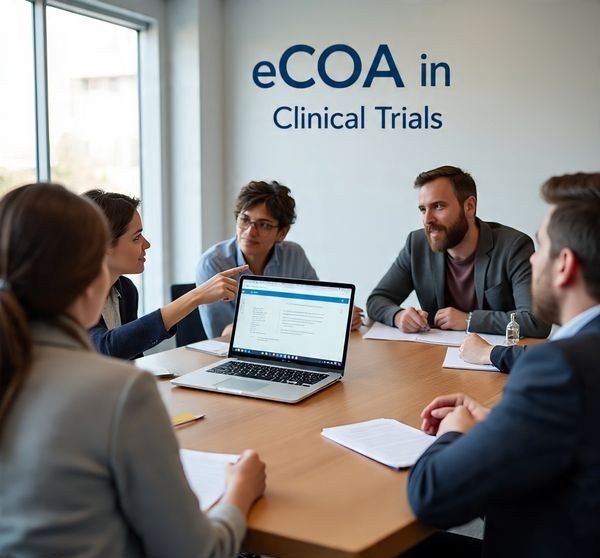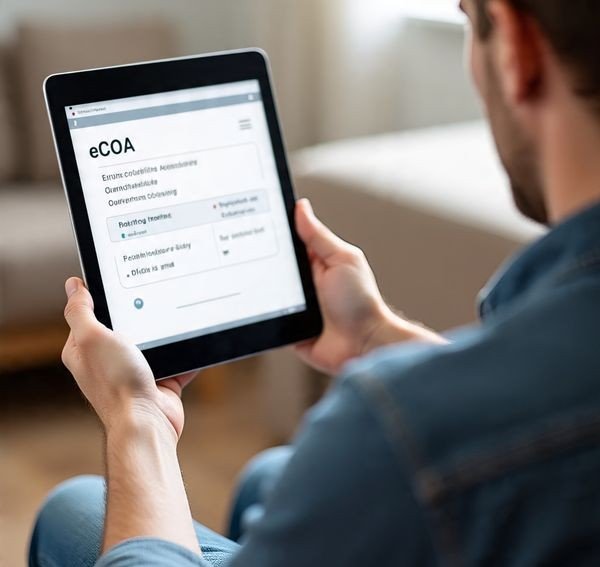What is eCOA in Clinical Trials?:Discover what eCOA in clinical trials means, how it’s used, and why it’s important in research, especially in CNS studies. Learn in easy terms!
What is eCOA in Clinical Trials?
If you’ve ever heard about clinical trials, you might already know that they play a huge role in testing new medicines and treatments. But do you know how researchers track and collect data during these trials? This is where eCOA comes in. You might be wondering, what is eCOA in clinical trials, and why is it so important?

Well, eCOA stands for electronic Clinical Outcome Assessment, and it’s changing the way clinical trials are done. Unlike the old-school paper methods, eCOA allows doctors and researchers to collect data electronically using apps, tablets, or even smartphones. It’s like taking notes digitally instead of on paper!
In this blog post, we’ll dive deeper into what eCOA is, how it works, and why it’s a game-changer for clinical trials—especially in fields like CNS (central nervous system) research. So, let’s break it down in simple terms!
What is eCOA in Clinical Trials?
Defining eCOA
Let’s start from the basics. eCOA is an abbreviation that stands for electronic Clinical Outcome Assessment. It’s a method used in clinical trials to gather data on how patients feel, function, and survive after taking a treatment. This data is essential because it helps researchers figure out if a new drug or therapy works.

Before eCOA, most of this information was collected on paper. However, with technology advancing, eCOA makes the process much faster and more accurate. Researchers use devices like smartphones, tablets, or even specialized kiosks to record this data.
Why is eCOA Important?
The move to electronic systems means fewer errors, faster data collection, and real-time updates. It also makes it easier for patients to participate, especially those with conditions that make visiting a clinic challenging. Thanks to eCOA, the days of scribbling on paper forms are over!
What is eCOA in CNS Clinical Trials?
When you think of clinical trials, you might picture new treatments for cancer or heart disease. But what about diseases that affect the brain and nervous system, like Alzheimer’s disease, Parkinson’s disease, or multiple sclerosis? These are all part of CNS clinical trials, where eCOA plays a huge role.

How eCOA Helps in CNS Trials
In CNS clinical trials, collecting patient feedback can be a bit tricky. After all, the central nervous system affects how we think, feel, and move. Patients with these conditions might have trouble remembering things, staying focused, or expressing their feelings clearly. This is where eCOA comes in handy.
With eCOA, patients can use apps to report their symptoms daily, without needing to write everything down. These digital tools can prompt patients with simple questions and track their answers in real-time. Researchers can then access the data instantly, helping them understand how a treatment affects the brain and nervous system.
Real-Life Example
Imagine a patient with Parkinson’s disease who participates in a clinical trial. They might have difficulty walking or may feel shaky at certain times of the day. With eCOA, this patient could use a smartphone app to record these symptoms whenever they occur. The app could also remind them to take their medication or answer questions about their mood. This makes it easier to capture data accurately over time.
How Does eCOA Work in Clinical Trials?
Now, let’s take a closer look at how eCOA actually works in clinical trials. Think of it as a bridge between the patient and the research team.

The Steps of Using eCOA
- Patient Enrollment: Once a patient joins the trial, they are given a device (like a smartphone or tablet) that has the eCOA app installed.
- Data Collection: The patient will then use this app to answer questions or record their symptoms daily. Some apps even have reminders to make sure the patient never forgets!
- Real-Time Data Transmission: As the patient enters their data, it is sent straight to the research team. This happens in real-time, meaning researchers don’t have to wait days or weeks for results.
- Analysis: The research team can now analyze this data to see how the treatment is affecting patients, whether the drug is working, or if there are any side effects.
eCOA vs ePRO: What’s the Difference?
If you’ve been reading about eCOA, you might have also come across the term ePRO, or electronic Patient-Reported Outcome. You might be wondering, what’s the difference between eCOA and ePRO? Let’s break it down.
Understanding ePRO
Both eCOA and ePRO collect data from patients, but ePRO specifically focuses on the patient’s perspective. This includes things like:
- How they feel (pain, fatigue, etc.)
- Quality of life
- Mental health
In other words, ePRO is one part of the eCOA system. While eCOA looks at a wide range of outcomes (including clinical data from doctors), ePRO zooms in on what the patient themselves reports.
How They Work Together
In clinical trials, both eCOA and ePRO are used together. The eCOA system may collect data from different sources, including the patient, the healthcare provider, and even the lab tests. The ePRO part then focuses on gathering the patient’s self-reported outcomes. These two systems work together to give researchers a complete picture of the treatment’s effectiveness.
Advantages of Using eCOA in Clinical Trials
You might be thinking, “That sounds great, but why should we switch to eCOA?” Well, there are several reasons why eCOA in clinical trials is such a big deal.

Benefits of eCOA
- More Accurate Data: Since patients input their data directly into digital devices, there’s less room for mistakes that come from handwriting or human error.
- Faster Reporting: Researchers get the data instantly, which means they can act on it faster.
- Better Patient Experience: Patients don’t need to fill out complicated paper forms. They can report their symptoms on their phones or tablets—anytime, anywhere.
- Real-Time Monitoring: Researchers can keep track of the patient’s progress on a daily or even hourly basis.
FAQ Section
Here are some common questions about eCOA in clinical trials:
1. What is eCOA in clinical trials?
eCOA stands for electronic Clinical Outcome Assessment, a digital tool used in clinical trials to collect data from patients about their symptoms, side effects, and overall health. It helps researchers track progress more efficiently and accurately.
2. What’s the difference between ePRO and eCOA?
While both eCOA and ePRO collect data from patients, eCOA includes data from multiple sources (like doctors and labs), whereas ePRO focuses solely on patient-reported outcomes, like how the patient feels or their quality of life.
3. What is an eCOA trial?
An eCOA trial is a clinical trial that uses electronic tools (like smartphones and tablets) to gather data from patients. These trials are often used to monitor patients’ responses to new treatments in real-time.
4. What does eCOA stand for?
eCOA stands for electronic Clinical Outcome Assessment, a method used to collect real-time data from patients in clinical trials. It helps researchers monitor patient progress and assess the effectiveness of a treatment.
Conclusion: eCOA is the Future of Clinical Trials
As you can see, eCOA in clinical trials is revolutionizing how research is done. It makes data collection easier, faster, and more accurate. Whether it’s tracking the progress of a new medication or understanding the impact of a treatment on patients’ lives, eCOA is an essential tool in modern research.
So, the next time you hear about a clinical trial, remember: eCOA is the key to collecting the data that can make a difference in finding new treatments. If you’re interested in learning more about clinical trials, check out our other posts on this topic!
Call to Action:
If you’re curious about clinical trials and want to learn more, don’t hesitate to explore our blog for more articles on the subject. Stay informed and stay healthy!
Read More: Your Simple Guide: How to Start a Home Health Care Agency in Texas













1 thought on “What is eCOA in Clinical Trials? A Simple Guide for Beginners”